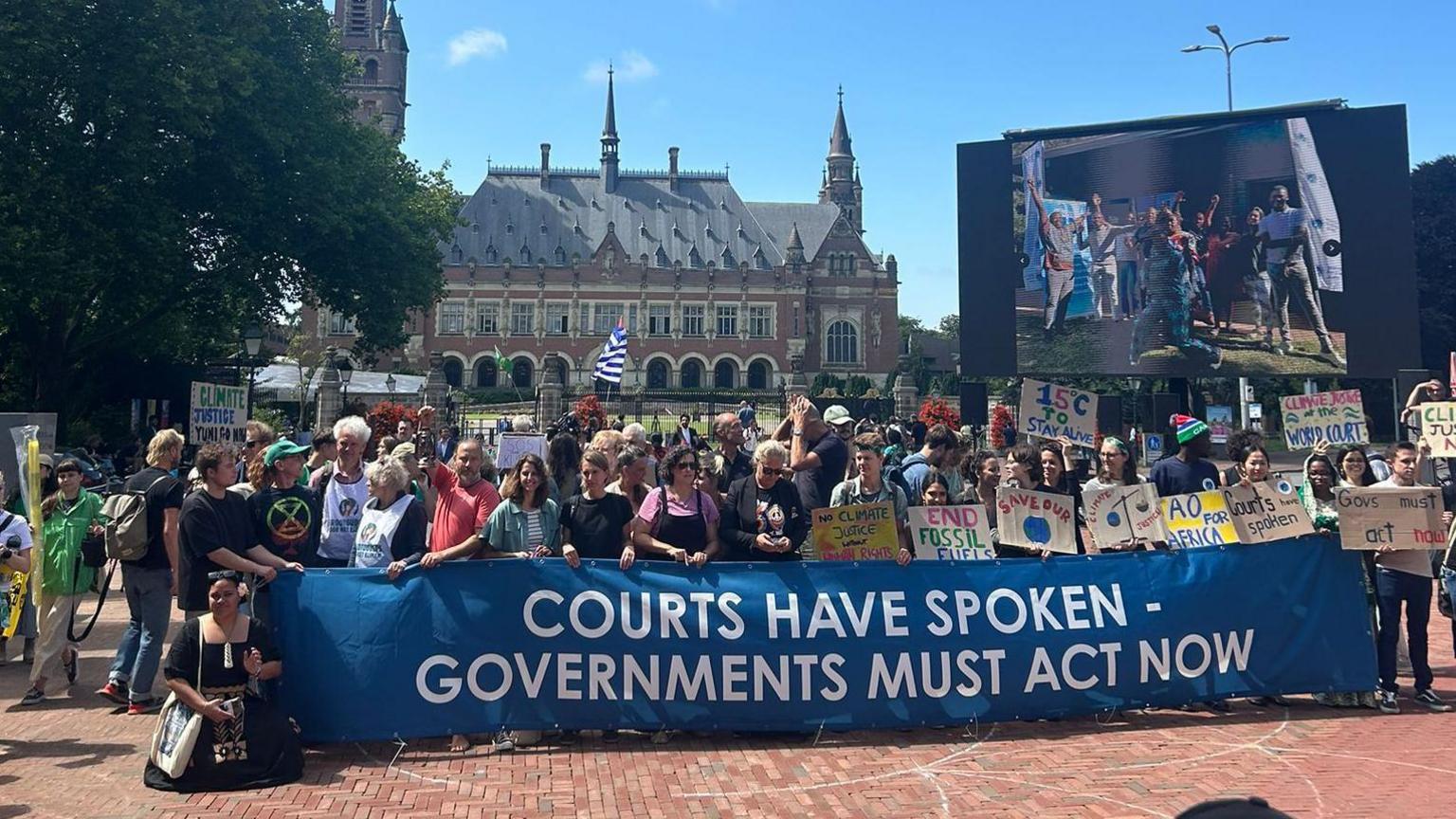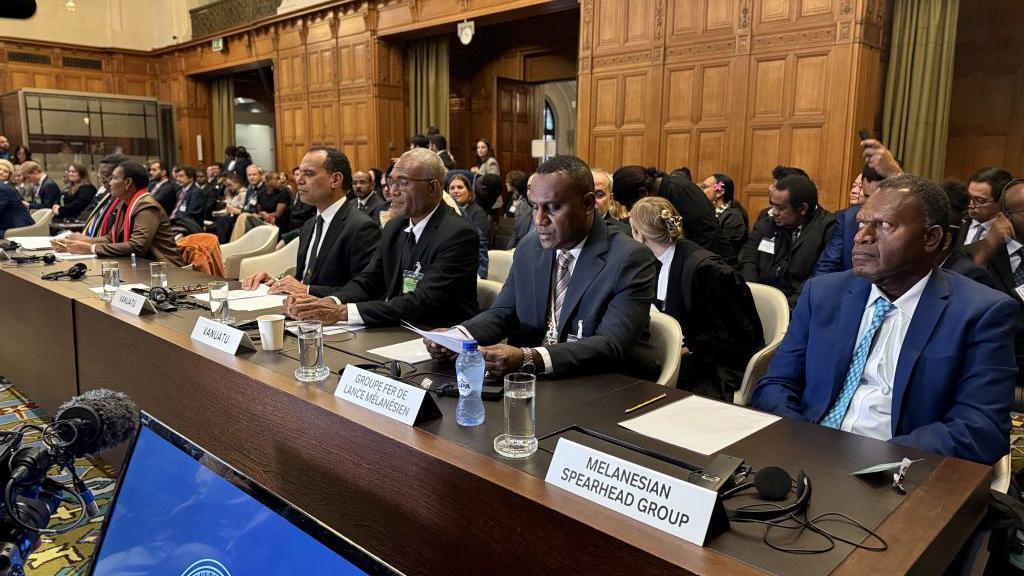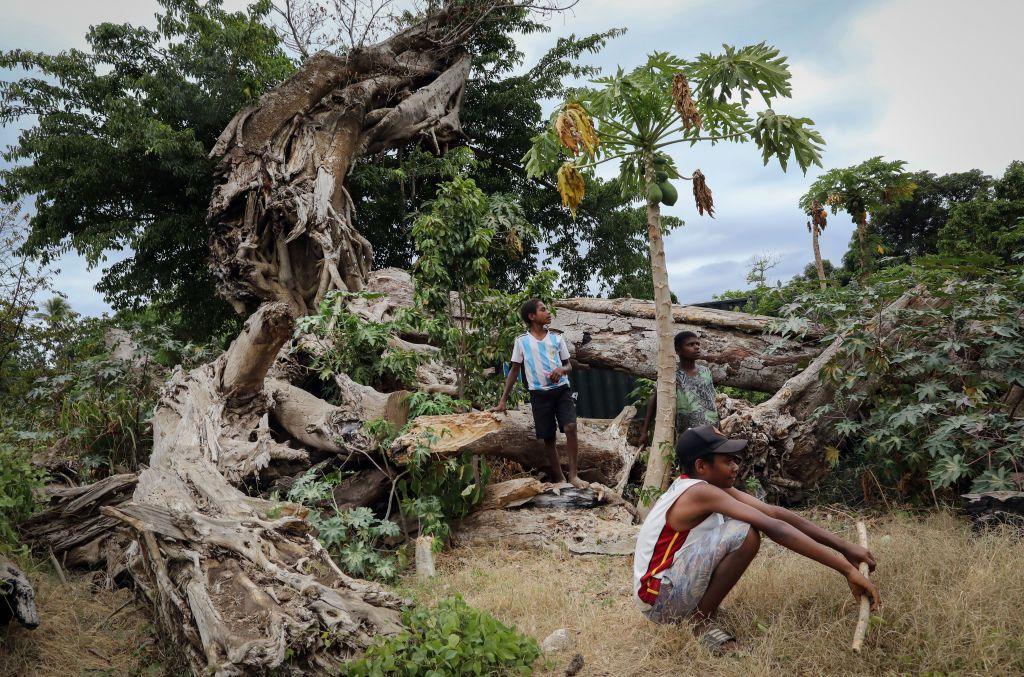Top UN court says countries can sue each other over climate change
Watch: Activists react to landmark UN climate change ruling outside The Hague
- Published
A landmark decision by a top UN court has cleared the way for countries to sue each other over climate change, including over historic emissions of planet-warming gases.
But the judge at the International Court of Justice in the Hague, Netherlands on Wednesday said that untangling who caused which part of climate change could be difficult.
The ruling is non-binding but legal experts say it could have wide-ranging consequences.
It will be seen as a victory for countries that are very vulnerable to climate change, who came to court after feeling frustrated about lack of global progress in tackling the problem.

Governments and climate campaigners went to the Hague on Wednesday to hear the court's opinion
The unprecedented case at the International Court of Justice (ICJ) was the brainchild of a group of young law students from low-lying Pacific islands on the frontlines of climate change, who came up with the idea in 2019.
One of those students, Siosiua Veikune from Tonga, was in the Hague to hear the decision.
"I'm lost for words. This is so exciting. There's a ton of emotions rushing through us. This is a win we take proudly back home to our communities," he told BBC News.
"Tonight I'll sleep easier. The ICJ has recognised what we have lived through - our suffering, our resilience and our right to our future," said Flora Vano, from the Pacific Island Vanuatu, which is considered the country most vulnerable to extreme weather globally.
"This is a victory not just for us but for every frontline community fighting to be heard."
The ICJ is considered the world's highest court and it has global jurisdiction. Lawyers have told BBC News that the opinion could be used as early as next week, including in national courts outside of the ICJ.
Campaigners and climate lawyers hope the landmark decision will now pave the way for compensation from countries that have historically burned the most fossil fuels and are therefore the most responsible for global warming.
Many poorer countries had backed the case out of frustration, claiming that developed nations are failing to keep existing promises to tackle the growing problem.
But developed countries, including the UK, argued that existing climate agreements, including the landmark UN Paris deal of 2015, are sufficient and no further legal obligations should be imposed.

Siosiua Veikune, from Tonga, from Pacific Island Students Fighting Climate Change travelled to the Hague to hear the outcome
On Wednesday the court rejected that argument.
Judge Iwasawa Yuji also said that if countries do not develop the most ambitious possible plans to tackle climate change this would constitute a breach of their promises in the Paris Agreement.
He added that broader international law applies, which means that countries which are not signed up to the Paris Agreement - or want to leave, like the US - are still required to protect the environment, including the climate system.
The court's opinion is advisory, but previous ICJ decisions have been implemented by governments, including when the UK agreed to hand back the Chagos Islands to Mauritius last year.
"The ruling is a watershed legal moment," said Joie Chowdhury, Senior Attorney at the Centre for International Environmental Law (CIEL).
"With today's authoritative historic ruling, the International Court of Justice has broken with business-as-usual and delivered a historic affirmation: those suffering the impacts of climate devastation have a right to remedy for climate harm, including through compensation," she added.
A spokesperson for the UK's Foreign, Commonwealth and Development Office said it was "taking time" to look at the opinion before commenting in detail, but added:
"Tackling climate change is and will remain an urgent UK and global priority. Our position remains that this is best achieved through international commitment to the UN's existing climate treaties and mechanisms."

Representatives of Pacific Island nations gave evidence at the court
The court ruled that developing nations have a right to seek damages for the impacts of climate change such as destroyed buildings and infrastructure.
It added that where it is not possible to restore part of a country then its government may want to seek compensation.
This could be for a specific extreme weather event if it can be proved that climate change caused it, but the Judge said this would need to be determined on a case by case basis.
"This is a huge win for climate vulnerable states. It's a huge win for Vanuatu, which led this case and is going to change the face of climate advocacy," said barrister Jennifer Robinson at Doughty Street Chambers, who represented Vanuatu and the Marshall Islands.
It is not clear how much an individual country could have to pay in damages if any claim was successful.
But previous analysis published in Nature, estimated that between 2000 and 2019 there were $2.8 trillion losses from climate change - or $16 million per hour.
During the evidence sessions in December, the court heard from dozens of Pacific Islanders who have been displaced as a result of rising sea level, caused by climate change.
The Marshall Islands highlighted that the costs for their island to adapt to climate change are $9 billion.
"That is $9 billion the Marshall Islands does not have. Climate change is a problem they have not caused, but they are forced to consider relocating their capital," said Ms Robinson.

A cyclone in 2015 in Vanuatu destroyed 276,000 homes and wiped out two-thirds of its GDP
As well as compensation, the court also ruled that governments were responsible for the climate impact of companies operating in their countries.
It said specifically that subsidising the fossil fuel industry or approving new oil and gas licenses could be in breach of a country's obligations.
Developing countries are already exploring bringing new cases seeking compensation for historic contributions to climate change against richer, high emitting nations citing the ICJ opinion, according to lawyers the BBC spoke to.
If a country wants to bring a case back to the ICJ to make a ruling on compensation then it can only do so against countries which have agreed to its jurisdiction, which includes the likes of the UK, but not US or China.
But a case can be brought in any court globally, whether that be domestic or international, citing the ICJ opinion, explained Joie Chowdhury from CIEL.
So instead a country may choose to take their case not to the ICJ but a court where those countries are bound e.g. federal courts in the US.
But the question remains whether the ICJ opinion will be respected.
"[The ICJ] is an institution that is subject to geopolitics – and it relies on states adhering to its judgements, it doesn't have a police force," said Harj Narulla, a climate barrister at Doughty Street Chambers, which also represented the Solomon Islands.
When asked about the decision, a White House spokesperson told BBC News:
"As always, President Trump and the entire Administration is committed to putting America first and prioritising the interests of everyday Americans."

Sign up for our Future Earth newsletter to get exclusive insight on the latest climate and environment news from the BBC's Climate Editor Justin Rowlatt, delivered to your inbox every week. Outside the UK? Sign up to our international newsletter here.